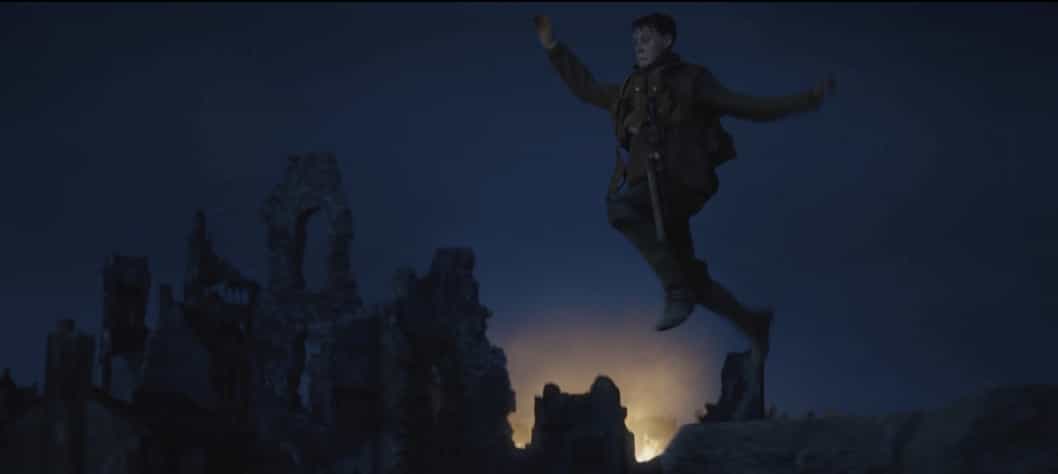Last week, I was in the cinema with 2 solid friends, being immersed in the film 1917, IMAX-style. It is not difficult to be lyrical about Sam Mendes’ film about two WWI soldiers desperately trying to relay a life-or-death message across no-man’s land to their fellow-soldiers.
I will not spoil any of this film, sort of. It needs to be seen in the cinema, as it is one of the very few WWI films that actually works, including all the gruesomeness that this war brought forth.
I ‘know’ WWI only from stories of my grandmother. She lived with her family in Zeeland, where she saw quite a few Belgian refugees fleeing from the German army in 1914.
On a few occasions, she vividly told me about the Battle of Messines (7-14 June 1917), which could be heard and felt in Zeeland (and far beyond) as this battle began with the detonation of 19 mines beneath the German front positions.
My grandmother inspired me to learn more about the Great War that changed the course of European and world history.
Back to the film. One scene in particular in 1917 struck a cord of a personal nature, obviously unrelated to any war experience of which I have none.
The scene depicts the main character Lance Corporal Will Schofield, played brilliantly by George MacKay, struggling to get out of a river across numerous dead and decaying human bodies.
The scene is horrifying in its realism, but what struck me the most was the complete desolation after he managed to crawl on the river bank. He sobs uncontrollably in his despair, and as a spectator you truly feel for him. Death is creeping up on him and escape or resolution (of sorts) seem impossible.
It struck me that this scene seems to carry a much deeper (for lack of a better word) longing, both for the main character and the viewer, than just the resolution of the story arch, that is Schofield’s mission to hand-deliver orders to the officer in charge at the front line. And that longing is perfectly portrayed by the song -Wayfaring Stranger- he hears afar as he finds the last bits of energy to carry on:
“I’m just a poor wayfaring stranger/Traveling through this world below/There is no sickness, no toil, nor danger/In that bright land to which I go.
I’m going there to see my Father/And all my loved ones who’ve gone on/I’m just going over Jordan/I’m just going over home.
I know dark clouds will gather ‘round me/I know my way is hard and steep/But beauteous fields arise before me/Where God’s redeemed, their vigils keep/I’m going there to see my Mother/She said she’d meet me when I come.
So, I’m just going over Jordan/I’m just going over home/I’m just going over Jordan/I’m just going over home.”
This song portrays a deep desire to be home, at peace; to be loved wholly by family and most importantly by God. Now, this seems to exude the nostalgic Sehnsucht we looked at before.
But, this is not looking-backward-nostalgia, but some kind of nostalgia that looks ahead. More precisely, it is analogical to nostalgia of something we have never experienced before and which cannot be experienced in this world.
In theological terms, this scene in 1917, perhaps unwittingly, depicts eschatological desire. Eschatology is a part of theology that deals with questions on the ultimate destiny of humanity. To be sure, in our modern post-religious culture, that destiny is nothing more than the grave. We simply cease to exist.
Yet, we are aware of that longing for completion, homecoming, and that awareness is hard, if not impossible, to shake off. Some say that it is an indication of the reality of God. Perhaps.
C.S. Lewis remarks in his Pilgrim’s Regress (which nowadays, rightly or wrongly, is coined as the [Lewisian argument from desire]( “Smilde, A. 2014. Horrid Red Herrings: A New Look at the ‘Lewisian Argument from Desire’ – and Beyond. Journal of Inklings Studies 4(1): 33-92.”)): “This Desire was, in the soul, as the Siege Perilous in Arthur’s castle—the chair in which only one could sit. And if nature makes nothing in vain, the One who can sit in this chair must exist.” Or as Psalm 37 sings more concretely:
“Trust in the Lord and do good;
dwell in the land and enjoy safe pasture.
Take delight in the Lord,
and he will give you the desires of your heart.”
The dichotomy (two opposites) -the certainty of death and true homecoming- is brilliantly and personally captured in 1917: we are not alone; we are loved, even in death. Against all odds, it is expecting Someone to be there ahead of our arrival. Kari Bremnes sings this longing beautifully in her E du Nord:
“E du nord i landet da [Are you in the North then]
ska du bare la mørket råde [Just let darkness prevail]
Førr en kveld, en kveld [Then one night, one night]
trekkes teppet fra [The curtain will be drawn]
og det kommer et lys av guds nåde [And God’s grace will shine through]
e du nord i landet da” [Are you in the North then]
